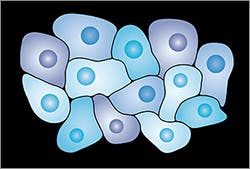A better understanding of the many subtle factors that influence growth of solid cancer tumors could be key to the development of effective ‘differentiation therapies’ that make cancers revert to normal tissue, rather than killing the cells.
The findings are according to a new Nature Reviews Cancer paper co-authored by Wyss Institute Founding Director Donald Ingber, M.D., Ph.D., and Amy Brock, Ph.D., a former Wyss Institute postdoctoral fellow who is now Assistant Professor in the Department of Biomedical Engineering at University of Texas at Austin.

The conventional view of cancer is that it results from a series of specific gene mutations that lead to unrestricted cell growth. In the review, Ingber and Brock discuss how inherent variability in gene expression and cues from the microenvironment, such as signals from extracellular matrix and physical forces, are key elements that govern how normal embryonic stem cells switch between different lineages, such as when they become lung, liver or kidney during development, and how similar mechanisms for switching between different phenotypes seem to be at work when normal adult cells transform into cancerous tumors. They also review how restoring the appropriate set of environmental cues can sometimes induce cancers to stop growing and differentiate.
Given this, there is promise that one day these factors might be manipulated through therapeutic intervention to influence crucial developmental shifts in cells – with the aim to prevent initial cell changes toward cancer or revert cancerous cells back to normal.